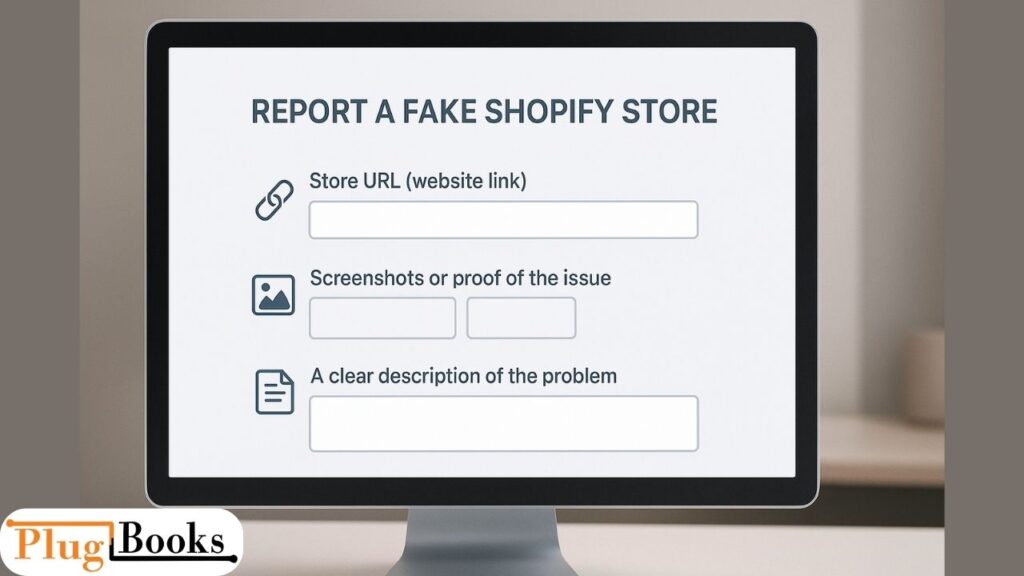If you’ve ever seen a shady online store, you might have asked yourself, “Should I report Shopify store scams or just leave them alone?” The truth is that reporting protects you and thousands of other shoppers as well.
This post will show you how to report a Shopify store, when to do it, and how solutions like automate Shopify reports and Shopify improved reports may assist honest sellers stay safe.
Keynotes Before You Start
- ✅ You can report Shopify store directly using Shopify’s official form.
- ✅ Reports can be filed for fraud, scams, copyright violations, or illegal products.
- ✅ Using tools like automate Shopify reports helps sellers avoid disputes.
- ✅ Shopify report seller actions are confidential — your identity is kept safe.
- ✅ Honest sellers benefit from Shopify better reports, which track transparency and performance.
Why Would You Need to Report Shopify Store?
There are a lot of reasons why customers or sellers might need to report bad behavior at a Shopify business. There are serious concerns with fake product listings, fraud, deceptive ads, and even dangerous goods. When a store goes too far, you have to report it, not just because you want to.
Some buyers, for instance, fall for deals that are “too good to be true” and lose their money. The scam goes on and more individuals get hurt if no one tells the store.
How Do I Report a Fake Shopify Store?
The easiest approach to report a Shopify store is to use the complaint form on Shopify’s website. Here is what you need:
- The link to the store’s website.
- Screenshots or proof of the problem.
- A clear explanation of the issue.
Personal Experience: I bought gym gloves from a store that seemed shady and never sent them to me. Shopify’s team requested receipts and screenshots when I told them about the store. They closed the fake store inside a week. It was a comfort and a reminder that doing something is important.

Can You Report Shopify Store Selling Scams?
Yes, of course! A lot of scam stores use bogus discounts or “free shipping” traps to deceive visitors. You may instantly report a Shopify store if this happens to you. Fraud is a big deal for Shopify. When there are enough complaints, the store is reviewed and often shut down.
If you’d also like to understand how much it costs to run or report a store while keeping your finances in check, check out this insightful guide on Shopify store costs by PlugBooks.
How to Report a Shopify Store for Copyright Infringement
If you sell things, you might notice rival stores imitating your designs, product photographs, or even your brand name. In that case, it’s best to file a shopify report seller request—Shopify provides a dedicated process for intellectual property complaints to protect your business.
Plus, if you’re curious about how your revenue might be impacted by these disruptions (and how to maintain clarity), this insightful PlugBooks article on Shopify revenue management is definitely worth a read.

Steps to Report a Shopify Store for Fraud
Here’s the exact way to do it:
- Visit Shopify’s official page for reporting a store.
- Pick the kind of problem you have (fraud, copyright, or unlawful goods).
- Include proof, such as emails, order confirmations, or pictures.
- Send in your report and wait for Shopify to look into it.
Shopify can check your complaint more quickly if you follow these steps.
What Happens After You Report Shopify Store?
After you send in your complaint, Shopify’s review staff will look into it. If the claims are true, the shopify report seller request could result in warnings, account suspension, or even a permanent ban for that store.
Shopify might get in touch with you for further details if the problem is complicated, but most of the time, problems are fixed within a week. For more details, you can check Shopify’s official reporting guide.
Is Reporting a Shopify Store Anonymous?
Yes — your identity is kept private when you report a Shopify store. Shopify doesn’t reveal your personal details to the store owner, so you can feel safe while protecting others.
Where Can I Report a Shopify Store for Illegal Products?
Some stores try to sell things that are dangerous, illegal, or even harmful. You can report a Shopify store using Shopify’s help center to cease this. Sometimes, depending on how serious the matter is, the government may also need to get in.
Automated Shopify reports are typically used by sellers who want to be compliant, keep track of what they’re selling, and avoid breaking the rules. To understand this better, check out this detailed Shopify Sales Tracker guide from PlugBooks.

How to Check if a Shopify Store Has Already Been Reported
If you’re not sure if someone has already marked a store, search for clues like:
- A missing checkout option.
- Messages that say “error” when you look at things.
- Store pages that seem incomplete or are “under review.”
These are often signs that shopify reports seller complaints are being looked into.
Automate Shopify Reports for Your Business
Customers might be worried about how to report a Shopify business, but merchants should be worried about how to stop it from happening. You can automatically keep an eye on sales, refunds, chargebacks, and suspicious activities using automated Shopify reports. This cuts down on arguments and keeps your brand’s good name safe.

Shopify Report Seller – What Does It Mean?
Just because you file a shopify report seller request doesn’t guarantee the store is guilty right away. Shopify is stating, “We’ll look into this.” Sometimes the problem is a misunderstanding, and sellers are given a chance to fix their mistakes before they face punitive penalties.
Shopify Better Reports – A Tool for Honest Sellers
Bad sellers get in trouble, but good sellers need tools to show that they are honest. Shopify’s enhanced reports give sellers detailed information about sales, returns, and interactions with customers.
These insights show that you run a clear business if someone tries to report your Shopify store for the incorrect reasons. It’s like having a safety net to catch fraudulent complaints.
How PlugBooks Can Help Sellers
It can be hard to handle reports, disagreements, and money on Shopify. That’s where PlugBooks comes in. PlugBooks makes it easy for sellers to keep accurate financial records, keep track of chargebacks, and stay compliant. It works with QuickBooks and Xero.
Sellers save time and make fewer mistakes by automating their bookkeeping with Shopify, Amazon, and eBay. This lets them focus on growing their business without having to worry about reports.

FAQs About Reporting a Shopify Store
1. How do I report a Shopify store quickly?
The fastest way to report a Shopify store is by using Shopify’s official complaint form. Provide the store link, screenshots, and details for a faster review.
2. Can I report a Shopify store without giving my name?
Yes, Shopify keeps your information private. When you report a Shopify store, your identity remains hidden from the seller.
3. What happens after I submit a Shopify report seller complaint?
Shopify looks into your request for a shopify report seller after you file it. If this is true, the store may be shut down or suspended.
4. Can sellers use automated Shopify reports to stop problems?
Yes! Automated Shopify reports keep track of refunds and disputes automatically, which helps sellers be honest and avoid getting complaints they don’t need.
5. What is Shopify better reports, and why should I use it?
Shopify better reports provide detailed insights into your sales and refunds. They’re especially helpful if someone wrongly tries to report a Shopify store.
6. How long does Shopify take to handle a report?
Most cases are looked at within three to five business days, but complicated fraud cases may take longer. Providing detailed evidence helps Shopify act faster.
Last Thoughts
To keep e-commerce safe, it’s important to know when and how to report a Shopify store. Buyers protect themselves and others from scams, while sellers safeguard their reputation with tools like automate Shopify reports and Shopify better reports. Responsible reporting helps Shopify maintain a trusted marketplace for everyone.



